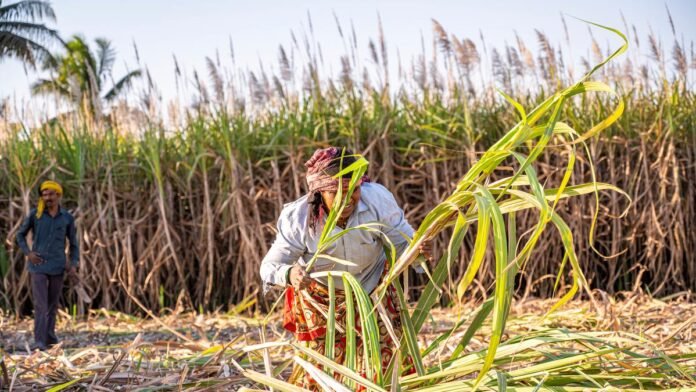The High Court of Bombay has recently taken suo motu cognisance of the exploitation of the intra-State workforce that migrates seasonally from the drought-affected and water-scarce regions of Marathwada to the sugar-belt region of western Maharashtra. Maharashtra is one of the top sugar producers in India. According to the Maharashtra Sugar Commissioner, in 2022-23, the net area under sugar cane was 1.487 million hectares, and there were 203 crushing factories in the State that were expected to produce 138 lakh metric tons of sugar.
Though intra-State migrant workers form the backbone of the sugar cane industry and economic growth, they have remained critically marginalised and oppressed for several decades. Considering the precarity of this migrant workforce, the High Court asked the Maharashtra government to form a committee of officers from various departments (with one nodal officer) to address their issues. Against this background, it would be critical to examine how ‘seriously’ the State develops policies and consistently implements strategic measures and existing labour laws for the effective inclusion of this precarious migrant group.
To deal with the prolonged unemployment after the sowing of rabi crops, millions of small and marginal peasant households from Beed, Jalna, Osmanabad, Latur, Nanded and Parbhani districts of the Marathwada region migrate to the sugar-belt districts such as Sangli, Kolhapur, Pune, Satara, Solapur and Ahmednagar to work in sugar cane harvesting and factories. Prolonged drought conditions, repeated crop failure, debt, and acute unemployment create an end-most situation for Marathwada’s rural labour, and, ultimately, they have to migrate seasonally. Therefore, there needs to be a long-term and comprehensive policy to address their vulnerability at both the source and destination.
The State government has to intervene in the prevalent exploitative structure of recruiting migrant workers in the sugar cane industry filed through the ‘Mukadam’ (labour contractor). The Mukadam has a contract with sugar factories to supply ‘Koytas’ (labour couples) and takes an advance to pay workers. The Mukadam system assures sugar factories a supply of a large volume of temporary, cheap, reliable, and efficient workforce (Breman, 1978). Because of eco-political reasons, the Mukadam system remains the focal point; migrant workers are very dependent on the Mukadam. Consequently, it creates adequate space to control migrant workers, violates labour laws, and is unfavourable to establish any relationship between the factory and workers.
Gaps in the data, plight of women, children
Inadequate data is the stumbling block in framing meaningful policies for seasonal migrants, especially when women migrants and children are largely invisible and un-enumerated. Hence, a periodic and time-bound enumerating exercise is critical to create a databank of seasonal migrants that is credible. A technology-aided Migration Tracking System (MTS) application was launched in 2022 by the Women and Child Development Department of the Maharashtra government, which was said to be the first-of-its-kind project in the country.
The MTS initially focused on seasonal migrants in the tribal districts to enumerate and track children, pregnant women, and lactating mothers at source and destination areas to ensure nutrition, immunisation and early childhood care, and continuity of the Integrated Child Development Services.
However, the MTS fails to create a comprehensive picture of seasonally migrating families, their current employment status, wage structure and entitlement coverage. With expanded scope, the revised MTS can be used in the State’s sugar belt and other seasonal migration corridors to enumerate migrants, understand the dynamics and clearly delineate the specific needs and interventions.
Another high priority area is addressing the plight of migrant women workers, and ensuring their health, safety and employment in the sugar cane labour market. In the sugar cane harvesting task, women workers are engaged in strenuous work such as headload cane bundles and carry heavy weight (40 kg-45 kg) on trucks or trolleys, which usually occur late in the evening, resulting in several accidents during the loading process (Oxfam India 2020).
Their work adversely impacts their body, causing musculoskeletal disorders and several gynaecological issues. UNESCO noted that early and forced marriages among migrants cause problems for adolescent girls, resulting in early pregnancies (15-17 years), deliveries in the absence of a trained birth attendant, frequent childbirth, no exclusive breastfeeding for the first six months and many other problems. Many studies have reported recurring violence and sexual harassment cases linked to the Mukadam and male workers. Despite multiple vulnerabilities among seasonally migrating women, the State government has not adopted any adequate long-term intervention strategy.
Though the National Education Policy (NEP) 2020 emphasises equitable and inclusive education for all, the Right to Education of children who accompany their parents to sugar cane fields is violated blatantly. There are no sufficient alternative schooling models, which in turn affect their education. They are probably forced into child labour. In their joint study, the International Institute for Population Sciences (IIPS) and UNICEF (2022) observed that despite these children being physically absent from school, school records do not acknowledge this in many cases.
There needs to be intervention to ensure that seasonal migrants have access to justice and are guaranteed safe and healthy working and living conditions. The State government must take the lead and collaborate with different Ministries and Departments to formulate targeted and time-bounded interventions. With a strong political will, it is possible to create a favourable legal environment to protect the rights of migrants by strengthening the labour administration. On the one side, it is said to be an Amrit Kaal with the vision of an empowered and inclusive economy to fulfil all its humanitarian obligations, while on the other, State functionaries constantly neglect a tribulation of the huge groups of seasonal migrants, leaving them helpless and in jeopardy. One must stop this deceit and take specific action.






